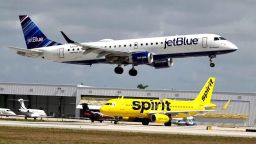Spirit Airlines shares tanked 47% on Tuesday after a federal judge in Boston ruled against JetBlue’s proposed $3.8 billion acquisition of the discount airline.
The ruling outlined several concerns, including increased fares for flyers, particularly for discount airlines Spirit’s customers and significant debt for JetBlue (JBLU).
JetBlue and Spirit told CNN that they disagree with the ruling.
“We continue to believe that our combination is the best opportunity to increase much needed competition and choice by bringing low fares and great service to more customers in more markets while enhancing our ability to compete with the dominant U.S. carriers,” JetBlue and Spirit said in a joint emailed statement to CNN. “We are reviewing the court’s decision and are evaluating our next steps as part of the legal process.”
JetBlue shares gained 4.9% on Tuesday afternoon.
The US Justice Department sued in March to halt the deal, marking the first time in more than 20 years that the government has sought to block a US airline merger.
The Biden administration has argued since taking office there needs to be greater competition between businesses, especially in the airline industry, to lower costs for consumers. Spirit (SAVE), with its low base fare business model that charges customers extra for everything, including carry-on bags, prompts larger carriers to offer a percentage of their seats at the lowest possible price.
“Today’s ruling is a victory for tens of millions of travelers who would have faced higher fares and fewer choices had the proposed merger between JetBlue and Spirit been allowed to move forward,” said Attorney General Merrick Garland in a statement on Tuesday. “The Justice Department will continue to vigorously enforce the nation’s antitrust laws to protect American consumers.”
JetBlue argued that the deal would create a new, stronger competitor to those four larger airlines and work to bring down fares, not increase them.
The US airline industry has gone through more than 20 years of mergers and consolidation before this deal was announced. The 10 major airlines that existed in 1999 have been combined into four major carriers — American Airlines, United, Delta Air Lines and Southwest Airlines — through a series of deals, often done as part of a bankruptcy proceeding. Those four large carriers carry about 80% of the nation’s air traffic.
The mergers have resulted in a much more profitable US airline industry, but far fewer choices for US air travelers, which can result in higher fares.
The Biden administration has taken a much more aggressive approach in fighting mergers and combinations, including in the airline industry. Ahead of this deal it filed a federal lawsuit that challenged the alliance in the the Northeast United States between American and JetBlue. That alliance was dropped as JetBlue tried to win approval of its purchase of Spirit.
The now-blocked JetBlue deal for Spirit came after JetBlue outbid a proposed merger between Spirit and another discount airline, Frontier Airlines. Spirit management had initially supported the Frontier deal, raising the possibility that regulators would block a deal with JetBlue. But once Spirit shareholders rejected the less lucrative Frontier deal, Spirit management changed course and accepted the deal with JetBlue.
There is one other merger now being sought in the US airline industry, a proposed $1.9 billion deal to combine Alaska Airlines and Hawaiian Airlines.
Shares of Hawaiian Holdings fell 2% on Tuesday afternoon.
Spirit has been a leader in the ultra-low cost portion of the airline market, with very low rates on top of which passengers pay for any extras, including carry-on bags. While that approach has prompted the nation’s major carriers to offer a certain number of seats on their planes in a “basic economy” class with similar fare structure, it has also regularly made Spirit the airline with the lowest customer satisfaction ratings and the butt of jokes on late-night television.










